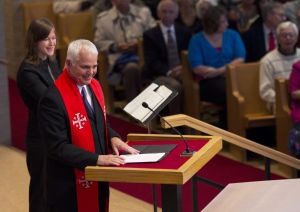What matters most: Diplomacy as a radical calling
By President James E. Brenneman, in the Summer 2012 Bulletin

We kicked off the school year by focusing on the core value of Servant Leadership. Mid-year, we poured out our hearts and hammers to help Habitat for Humanity build a home for custodial staff member Eddie Mayorga and his family. As the year closed, we sent a new batch of Servant Leaders into the world as ambassadors of Goshen College.
In saying goodbye to members of the Class of 2012, I reminded them that their true vocations, no matter their majors, were to be Ambassadors for Christ and Diplomats of Reconciliation. I asked them to consider a few basic questions: In a world where those on all sides of every issue consider themselves to be prophets, do we need more prophets running around? In a world where those on all sides of every issue consider themselves to be “rightly dividing the Word of Truth,” do we need more clever exegetes and historical deconstructionists? In a world filled with moral ambiguity and indulgence, do we need ever more rigid legal and ethical guidelines, judicial decisions, and coercive moral arbiters? In a world of ever more selective identity politics, do we need more excommunications by the right or left, the red or blue, the purple or other-than-purple? I sincerely doubt it.
We are called, instead, to bring former enemies together, to unite friend and foe. How radical is that? Amid pervasive ideological conflict, being an ambassador, a diplomat, may be the most radically counter-cultural calling. To be a diplomat of reconciliation may truly be more radical than that of an apostle, a prophet, a priest; more so than a preacher, a teacher, a nurse; beyond that of an artist, an engineer, or judge. Whatever one’s profession, there is no greater vocation needed on earth, no more timely calling than to be an Ambassador for Christ, a Diplomat of Reconciliation.
Recently, I led a group to one of the most conflict-riddled places on earth, Palestine/Israel. While there, we visited a great Christian leader, the Rev. Zoughbi Zoughbi, founder and director of Wi’am, the Palestinian Conflict Resolution Center. He also happens to be the father of Marcelle Zoughbi ’13. Some of our students spent last summer serving in Wi’am’s summer programs for kids. Wi’am in Arabic means “cordial relationships” – developing relationships across profound differences. That is exactly what Zoughbi Zoughbi’s team does, day in and day out, year after year. In our parting, he presented me with a red stole with white Jerusalem crosses embroidered in its fabric. I wore the stole at our Baccalaureate service as a sign of our common bond in Christ, our common call to be Diplomats of Reconciliation and our solidarity with him in his holy work.
In a time of division, demonization, and polarization without end, Wendell Berry reminds us, “the ground of our reconciliation will have to be larger than the ground of our divisions.” The role of prophet may just have to give way substantially to that of diplomat, ambassador, and reconciler.
Jesus said in his great Sermon on the Mount, which underlies the mission of Goshen College, “if we are only friends with friends, how are we different from anyone else? Anyone can do that. Rather, it is when we are able to befriend foes that the true miracle of our faith is made plain for all to see.” It is that “second-mile” love that demonstrates whether or not we are truly Christ-followers. Our greatest challenge today may simply be to deeply befriend someone with whom we have profound disagreements.
Would that each of us find that friend or better, make a friend, who is so different from us that the opportunity to be an Ambassador for Christ, a Diplomat of Reconciliation, is truly an opportunity of a lifetime. In so doing, our lives will truly manifest the kingdom of God on earth as it is in heaven. In so doing, healing and hope will be born anew in this broken world, little by little, peace by peace.




